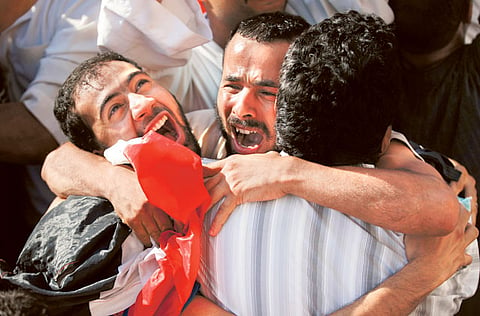Mursi declared winner in Egypt
Muslim Brotherhood's Mohammad Mursi declared new president

Cairo: Muslim Brotherhood member Mohammad Mursi has been declared the first president of Egypt since a popular uprising ousted Hosni Mubarak, the head of the electoral commission announced on Sunday.
Mursi, who ran against ex-prime minister Ahmad Shafiq, won 51.73 percent of the vote after a race that polarised the Arab world's most populous nation.
"The winner of the election for Egyptian president on June 16-17 is Mohammad Mursi Eissa Al Ayat," said Faruq Sultan.
Mursi won 13,230,131 votes against Shafiq who clinched 12,347,380.
The UAE government sent a cable of congratulations to Mursi shortly after the result was announced. "The UAE welcomes the outcome of the election result of Egyptian and expresses its respect for the Egyptian people's choice in the context of his brother democracy," according to an official statement.
The election, in which more than 50 million voters were eligible to cast their ballot, saw a 51.8 percent turnout.
Thousands of Egyptians packed into Cairo's Tahrir Square on Sunday to celebrate the presidential election victory of Mohammad Mursi, waving flags and posters of the Islamist leader.
"God is greatest" and "down with military rule" they chanted as some set off fire crackers minutes after the election commission formally declared the Muslim Brotherhood's candidate as the winner
From prisoner to president
In a reversal of fortunes unthinkable a year and a half ago, an Islamist jailed by Hosni Mubarak has succeeded him as president of the biggest Arab nation in a victory at the ballot box which has historic consequences for Egypt and the Middle East.
The Muslim Brotherhood's Mohammad Mursi will not enjoy the extent of modern, pharaonic powers exercised by Mubarak: those have been curtailed by a military establishment which will decide just how much he will be able to do in government.
Still, the US-trained engineer's victory in the country's first free presidential election breaks a tradition of domination by men from the armed forces, which have provided every Egyptian leader since the overthrow of the monarchy 60 years ago, and installs in office a group that drew on 84 years of grassroots activism to catapult Mursi into the presidency.
He has promised a moderate, modern Islamist agenda to steer Egypt into a new democratic era where autocracy will be replaced by transparent government that respects human rights and revives the fortunes of a powerful Arab state long in decline. Mursi is promising an "Egyptian renaissance with an Islamic foundation".
Yet the stocky, bespectacled 60-year old, appears something of an accidental president: he was only flung into the race at the last moment by the disqualification on a technicality of Khairat Al Shater, by far the group's preferred choice.
With a stiff and formal style, Mursi, who has a doctorate from the University of Southern California, cast himself as a reluctant late comer to the race, who cited religious fear of judgement day as one of his reasons for running. He struggled to shake off his label as the Brotherhood's "spare tyre".
Questions remain over the extent to which Mursi will operate independently of other Brotherhood leaders once in office: his manifesto was drawn up by the group's policymakers. The role Shater might play has been one focus of debate in Egypt.
"I will treat everyone equally and be a servant of the Egyptian people," Morsy said at his campaign headquarters in Cairo shortly after polling ended, a week before his victory was confirmed by the Mubarak-era body overseeing the vote.
But many Egyptians, not least the Christian minority, remain suspicious of Morsy and even more so of the group he represents.
Anti-Brotherhood sentiment, fuelled by both a hostile media and some of the group's policies, has soared in recent weeks.
Divided nation
Ahmad Shafiq, the former general he defeated, won nearly as many votes as Mursi, signalling that Egypt is a nation that is anything but united around the idea of Brotherhood rule. Mursi won a little less than a quarter of the first-round vote in May.
That a man who served as Mubarak's last prime minister was so close to victory has been seen as one sign of failure by the Brotherhood - which has described itself as the victim of a vicious campaign orchestrated by its enemies.
Sign up for the Daily Briefing
Get the latest news and updates straight to your inbox



